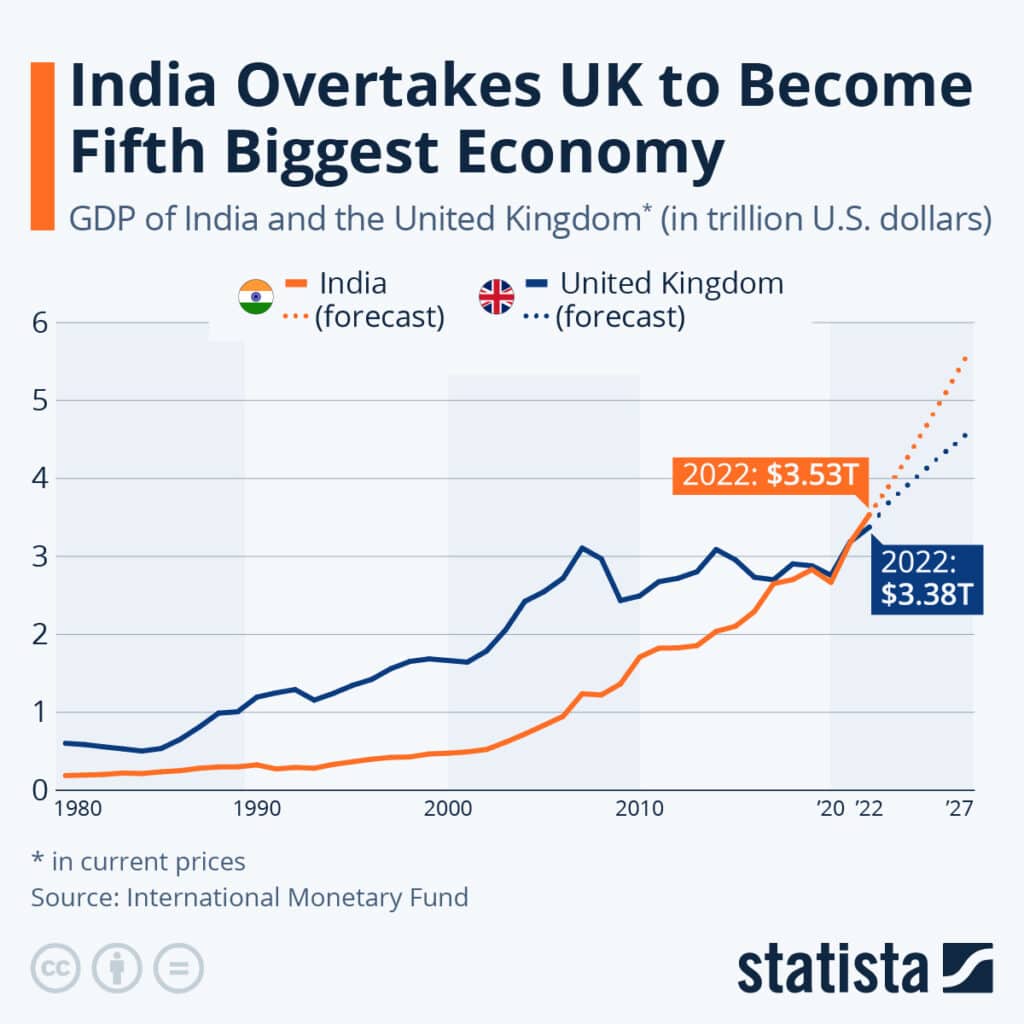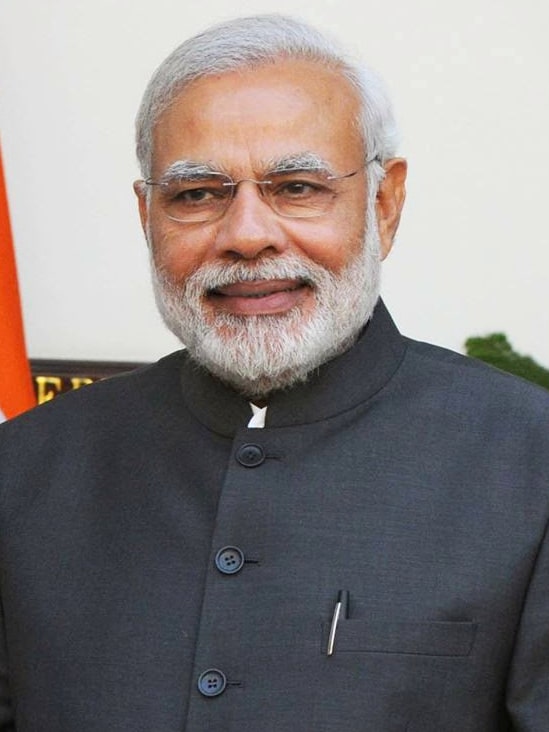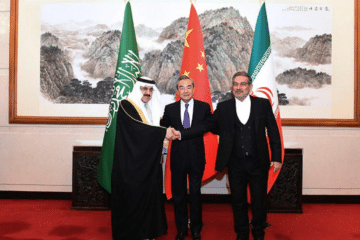Who is afraid of India ? India has only many good friends, and some who are less friendly. Even Pakistan, the self-designated ennemy of India since the ominous partition ( 1947) and the Mumbai’s terror attacks ( 2011), has so much to fix with its deep economic, financial and political internal crisis that its enmity against India is no more than a good reason for the army to keep control of a troubled Islamic Republic – and the Pakistanese army is for now of no match against the Indian army.
Who wants to deal with India ? From the European Nations to the US and from China to Russia, everybody wants to take some part of the so promising Indian market. First, for its worforce, the first of the world ; second for its innovation capacities ; third, for the so huge consumer market to come with a thriving middle class, the already exciting financial market of Mumbaï, and of course, the digital market. One and half billion citizens and expected consumers deserves some attention.
Who noticed when India GDP overpass British GDP, the same year the Conservative Party elected Richi Sunak, an Indian-born English citizen, as Prime Minister of England ? And who is afraid if India is to become the third economuy of the world, bypoassing Germany and Japan, somewhere by the 30’s of this century ( as it did already in Purchasing Power Parity)?
No noise, no chocks and no threats, and near no Western intelligence about what kind of play India is about to win. Because India is proceeding quietly on colf feet – smooth, soft, and cool. Because India could be one of the big winners of a not so win-win game in Asia, the Indian Ocean and the world. India plays a very specific game in geopolitics. Keep open as many opportunities as possible, pursue permanent interests with as many contributors as possible, and softly avoid any kind of confrontation ; who knows about the great strtegic Indian thinker Kautilya, and his Arthashastra ?

A lot of Western observers knew something about the demographic dividend that plays such a role to make India great – with about 2 billion people, the Indian subcontinent will represent near half of the young workforce in the world in the coming decade. They got some views about the education and training system whose best example is given by the so called Indian Institutes of Technology, to deliver by the millions engineering and sofware professional capabilities every year, makig India and Bangla Desh a land of big promises for all hitech, software, biotech and also industrial companies – just have a look at the research centers of Siemens, Alstom or Michelin in India ! Skilled, well trained and young ; such an asset is ot widely shared !
But there is far more to see, and it comes from politics, both on the domestic and international scale. From the independance, and mainly since the end of the Nehru’s fascination for state socialist entreprises, India managed a carefully crafted policy of balance between great powers and neighbours. And it won a lot in this delicate exercise. First of all, a hard cut agreement with the US and the AIEA won India the international status of a nuclear power, both civil and military, with very little strings attached.
What was an amazing diplomatic success is the key of a subtle equilibrium ; India is the current best example of non-alignement. Once, they agree to join and invest in the Indo-Pacific alliances the US are eager to set up against China, like the Quad with Japan, Australia and the US. And the Indian Navy participated in naval exercises aiming to keep safe and free maritime routes between the Indian Ocean and the Pacific. The next week, they signed trade agreements to settle in yuan natural resources they deeply need, they develop trade relations with the Brics and the OSC, and they have close links with Saudi Arabia and Iran as well. At the same time, for any investor’s meeting, the biggest American investors flew to Delhi or Bangalore, and Russia cut a major investment deal with India, its main oil buyer.
At the same time, India plays full speed economic and technic globalization, and emphasizes a politic of civilization based on Hindutva, the common way of life of all Indian citizens. And, despite bad judgments from the West ( for Instance, from Bruno Racine, CNRS ), it works. Identity politics bring back pride, trust, and will for Hindus. At the same time, millions of soft engineers and digital experts attracts hundreds of western companies, and thousands of Hindu temples are under construction – and illegal meat consumers are regularly killed by their Hindu neigbours, when Moslims Indian citizens claim full scale control of growing parts of the country. Incredible India !

What is it to say ? India was not so comfortable in a world under a sole hyperpower – even if they adapted quite well, using a strong geopolitical situation and very smart foreign secretaries and diplomats. Kautilya not forgotten ! And they felt deeply the treachery of the US and Henry Kissinger, taking side with the Pakistan when Bangla Desh was fighting for its independance ( 1971), as they were hurt by the lasting cooperation between US intelligence and Afhgans insurgents, even terrorists, to fight against Russian occupation forces ( just read Richard Labévière, « Les dollars de la terreur »). India feels not better with an assertive, sometimes aggressive China, so sensitive about anything they keep as an involvement in their internal affairs – from the Dalaï Lama visiting Eastern part of India, to India reclaiming its historical rights on lost territories in the Himalayas – with some lithium inside…
But the current situation, heading to multipolarity, with an entirely new fluidity in trade, financial and politicial relations, is of major interest for India. In the new new world that comes from the Russian « special operation » in Ukraine, India is set to maximize its bargaining power, and to make a lot of money from the mistakes of the European Union – first of all, using the first refinery capacity in the world to sell refined russian oil to a starving Europe at huge margin. Perhaps it is what Indians call » multialignment », the ne mantra of the secretary for foreign affairs ! With a very small public debt, huge gold reserves ( public and private ), and a very attractive internal market, India is doing well to use the monetary reset and financial disorder – being a member of the Quad, the Brics, the OCS, and many other regional agreements, and at the same time keeping the liberty to act as a sovereign power in the Indian Ocean, from Saudi Arabia and Iran to Burma and Madagascar, obviously one the most important straegic area of the coming decades, is not a lost cause !

The peace agreements to come with Pakistan and China would add the final touch to the soft coming back of India – after two centuries of colonial damage, and without previous notice, India as the third power in the world, just after the US and China. Except from the ominous « report » of the BBC about the past actions of Narendra Modi, who cares when India overpass the Great Britain to become the fifth economy in the world ? Growth rate about 5 % to 6 % yearly when European Countries are struggling to maintain 1 % has some benefits.
The least is not that the politics in India are still strongly based on economic and social progress. The lasting contract between the government, representatives and the people of India is clear ; progress means economic growth and social improvements. The progress thing, deeply broken in Europe and also in North America – is the woke culture a progress ? – works full time in India. The machinery of the economy is broken in Europe, and doing not so well in the Americas, where environnemental concerns and the limits of human capabilities and natural resources are just front of. India still needs to meet basic needs, still fight for food, water, sanitation, medicine, and social safety net. And this needs shaped the political agenda – who delivers, and who doesn’t. Growth still makes a difference for Indian citizens. Growth means good. And the economic achievements of the second term of Narendra Modi are not to play a small role in the coming election row. In fact, the Modi’s governement was doing good to shape economic growth to the benefits of a wide majority of Indian citizens. From education and training to food self-reliance, the self-centered Indian macroeconomic policy and the independant monetary and financial policy as well are working quite good.
This is not to say India wont meet hurdles and obstacles on its way to power. A lot of incentives could attract India on the dangerous way of opening its markets to foreign interests looking after land grabbing, property rights and free trade – using Indian workforce without giving something back to India. What is at stake is social stability, heavily dependant of rural population still representing 45 % of the Indian population – Indian village, for Gandhi the craddle of Indianness, is not to be the target of mass desertification, as it was in China with dire consequences. Is the participation of « Awake Localists » in the Modi’s majority a guarantee against India coming to be a « no where » country, with no territorial differene attached ? What is at stake is the social control, when the average Indian citizen is using 20 US apps every day, with all the leverage, mass propaganda and brainwashing it means. And what is at stake is the Indian identity itself, with american sects and evangelist churches pursuing a very agressive policy of ass conversions, a growing Moslim population searching its place in Hundutva, and some separatist movements strongly supported from the outside.
At the end of the day, what is at stake is no less than Indianness – the singularity of Indian way of life, expressed by the concept of « Hindutva » ( Ram Madav, « Hindutva, the Indian paradigm »). Above religion, origin, even culture or language, Hindutva means the shared treasure of Indians, what makes them united, what makes them different from the rest of the world. And a great deal of the growing soft power of India has something or a lot to do with Hindutva, the way to keep living and vibrant an Indian politic of civilization.
Hervé Juvin


0 commentaire